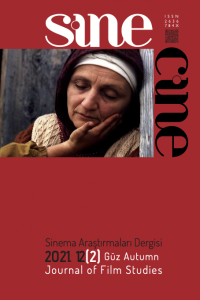DECEIT, DESIRE, AND THE FILMS OF ZEKİ DEMİRKUBUZ
This article analyses four films by Zeki Demirkubuz, Kor (Ember, 2016), İtiraf(Confession, 2001), Masumiyet (Innocence, 1997), and Kader (Destiny, 2006),which deal with the themes of unrequited love, jealousy, and betrayal. Analysisreveals the dynamics of desire in these four films. Kor and İtiraf, both of whichdepict the sad plight of jealous husbands who agonize over their wives’ infidelity,illustrate Rene Girard’s theory of triangular desire by introducing a third personin the genesis and perpetuation of the subject’s desire. Masumiyet and Kader,on the other hand, are interpreted as modern takes on the theme of courtlylove, in which the lover elevates the beloved to the status of sublime object.Masumiyet and Kader are analysed through the lens of Lacanian psychoanalysis,particularly in relation to Lacan’s and Zizek’s writings on the anamorphic gazeand masochistic contract present in courtly love. The article shows that all fourfilms demystify the concept of romantic love, thereby demonstrating Lacan’scontention that a spontaneous, unmediated and harmonious sexual relationshipbetween a man and a woman is impossible.
ZEKİ DEMİRKUBUZ FİLMLERİNDE ARZU VE İHANET
Bu makale, Zeki Demirkubuz’un karşılıksız aşk, kıskançlık ve ihanet temalarını ele alan filmlerinden Kor (2016), İtiraf, (2001), Masumiyet (1997) ve Kader (2006) üzerine odaklanarak bu filmlerde işleyen arzu dinamiklerini aydınlatmayı amaçlamaktadır. Öncelikle karısının kendisini aldattığı şüphesiyle kıvranan erkeklerin dramlarını konu alan Kor ve İtiraf filmlerinin Rene Girard’ın üçgen arzu kuramına uygun düşecek şekilde, arzunun doğuşunda ve sürdürülmesinde üçüncü şahısların oynadığı aktif rolü ortaya serdiği gösterilecektir. Masumiyet ve Kader’de resmedilen ilişki, aşığın sevdiği kadını yüce bir nesne konumuna yükselttiği şövalye aşkının modern bir versiyonu olarak yorumlanacaktır. Masumiyet ve Kader, Lacancı psikanaliz ışığında, bilhassa Lacan’ın ve Zizek’in şövalye aşkında işleyen anamorfik bakış ve mazoşizm dinamiğine dair yazdıklarından yararlanmak suretiyle incelenecektir. Sonuç olarak bu makalenin amacı, yukarıda adı geçen filmlerin romantik aşk kavramının büyüsünü bozarak Lacan’ın kadınla erkek arasında kendiliğinden, dolayımsız ve dengeli bir cinsel ilişkinin mümkün olmadığına dair tezini kanıtladığını göstermektir.
___
- Barnard, S. (2002). Introduction. In S. Barnard & B. Fink (Eds.), Reading Seminar XX: Lacan’s Major Work on Love, Knowledge and Feminine Sexuality (pp. 1-20). New York: State University of New York.
- De Rougemont, D. (1983). Love in the Western World (M. Belgion, Trans.). New Jersey: Princeton UP.
- Demirkubuz, Z. (Producer/Director/Screenwriter). (1997).
- Masumiyet (Innocence) [Motion Picture]. Turkey: Mavi Film.
- Demirkubuz, Z. (Producer/Director/Screenwriter). (2001). İtiraf (Confession) [Motion Picture]. Turkey: Mavi Film.
- Demirkubuz, Z. (Director/Screenwriter). (2006). Kader (Destiny) [Motion Picture]. Turkey & Greece: Mavi Film & Inkas Film.
- Demirkubuz, Z. (Director/Screenwriter). (2016). Kor (Ember) [Motion Picture]. Turkey: Mavi Film.
- Evans, D. (1996). An Introductory Dictionary of Lacanian Psychoanalysis. London & New York: Routledge.
- Freud, S. (2001). On the Universal Tendency to Debasement in the Sphere of Love. In J. Strachey (Ed. & Trans.), The Standard Edition of the Complete Psychological Works of Sigmund Freud (Volume XI, pp. 177-190). London: Vintage.
- Girard, R. (1965). Deceit, Desire and the Novel (Y. Freccero, Trans.). Baltimore: The John Hopkins Press.
- Girard, R. (1989). Violence and the Sacred (P. Gregory, Trans.). Baltimore & London: The John Hopkins UP.
- Lacan, J. (1991a). The Seminar of Jacques Lacan Book I: Freud’s Papers on Technique. (J-A. Miller, Ed.). New York & London: W.W. Norton and Company.
- Lacan, J. (1991b). The Seminar of Jacques Lacan Book II: The Ego in Freud’s Theory and in the Technique of Psychoanalysis. (J-A. Miller, Ed.). New York & London: W.W. Norton and Company.
- Lacan, J. (1997). The Seminar of Jacques Lacan Book VII: The Ethics of Psychoanalysis. (J-A. Miller, Ed.). New York & London: W.W. Norton and Company.
- Lacan, J. (1998). The Seminar Of Jacques Lacan Book XI: The Four Fundamental Concepts Of Psychoanalysis. (J-A. Miller, Ed.). New York & London: W.W. Norton and Company.
- Lacan, J. (1999). The Seminar of Jacques Lacan Book XX: On Feminine Sexuality. (J-A. Miller, Ed.). New York & London: W.W. Norton and Company.
- Lacan, J. (2001). Ecrits: A Selection (A. Sheridan, Trans.). London & New York: Routledge.
- Meloni, M. (2002). A Triangle of Thoughts: Girard, Freud, Lacan. JEP: European Journal of Psychoanalysis, 14. Retrieved from http:// www.psychomedia.it/jep/number14/meloni.htm.
- Phillips, A. (1996). Monogamy. London: Faber and Faber.
- Sedgwick, E. K. (1985). Between Men. New York: Columbia UP.
- Suner, A. (2010). New Turkish Cinema. London: I.B. Tauris.
- Taylor, V. E. (2000). Contracting Masochism: Pain, Pleasure and the Language of Power. In M. C. Finke & C. Niekerk (Eds.), One Hundred Years of Masochism (pp. 53-71). Amsterdam: Rodopi.
- Poe, E. A. (1990). The Imp of the Perverse. In S. Levine & S. Levine (Eds.), The Short Fiction of Edgar Allan Poe (pp. 268-271). Urbana & Chicago: University of Illinois Press.
- Zizek, S. (1992). Looking Awry. Cambridge & London: The MIT Press.
- Zizek, S. (1994). The Metastases of Enjoyment. London & New York: Verso.
- Zizek, S. (2008). The Plague of Fantasies. London & New York: Verso.
- ISSN: 2636-784X
- Yayın Aralığı: Yıllık
- Başlangıç: 2010
- Yayıncı: Semire Ruken Öztürk
Sayıdaki Diğer Makaleler
Ankara Uluslararası Film Festivali: 30 Yıl, 3 Bakış
Oğuz ONARAN, Seçil BÜKER, S. Ruken ÖZTÜRK
Güney Kore Hükümetlerinin Kültür Politikaları ve Sinema Endüstrisi Destekleri
ZEKİ DEMİRKUBUZ FİLMLERİNDE ARZU VE İHANET
GÜNEY KORE HÜKÜMETLERİNİN KÜLTÜR POLİTİKALARI VE SİNEMA ENDÜSTRİSİ DESTEKLERİ
DECEIT, DESIRE, AND THE FILMS OF ZEKİ DEMİRKUBUZ
TAVŞANLARIN GÖZÜNDEN, TAVŞANLAR DAHİL: BAŞKA TÜRLÜ BİR BERLİN DUVARI BELGESELİ
SES TASARIMININ KOMEDİ FİLMLERİNDE ANLATI ÜZERİNE ETKİSİ: AİLE ARASINDA FİLMİ ÖRNEĞİ
KADININ KUTSAL ANLATILARA KARŞI MÜCADELESİ: DALGALARI AŞMAK FİLMİNDE KADIN MESİH FİGÜRÜ
